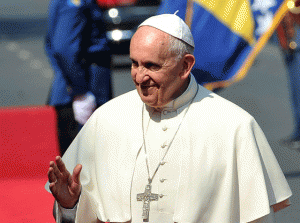SARAJEVO: Pope Francis on Saturday attacked “the atmosphere of war” currently besetting the world as he urged Bosnians to pursue reconciliation efforts, 20 years after a conflict that ripped the country apart.
Many conflicts across the planet amount to “a kind of third world war being fought piecemeal and, in the context of global communications, we sense an atmosphere of war,” the pontiff said in a mass at Sarajevo’s Olympic Stadium during a one-day visit to the Bosnian capital.
“Some wish to incite and foment this atmosphere deliberately,” he added, attacking those who want to foster division for political ends or profit from war through arms dealing.
“But war means children, women and the elderly in refugee camps, it means forced displacement, destroyed houses, streets and factories: above all countless shattered lives.
“You know this well having experienced it here.”
The pontiff had earlier referred to Sarajevo, with its synagogues, churches and mosques side by side, as a “European Jerusalem”, a crossroads of cultures, nations and religions which required “the building of new bridges while maintaining and restoring older ones.”
In a reference to the legacy of the war, which left Bosnia permanently divided along ethnic lines, he urged the country’s Muslim, Serb and Croat communities to reach out to each other.
“In so doing, even the deep wounds of the recent past will be set aside,” Francis said in a meeting with officials of the rotating presidency.
The 78-year-old then headed in his popemobile to the stadium, where he was given a rapturous reception by the 65,000-strong crowd.
Prayer for peace
“I am here because I want peace across the whole world and an end to war and hate,” said Branimir Vujca, 50, a doctor from Kiseljac in central Bosnia, who had come with his wife and three children.
Katarina Dzrek, a Bosnian Croat who was also in the crowd, added: “Bosnia is in need of the message of peace the pope will send because there is still a lack of trust between.”
Around 20,000 visitors from neighboring Croatia, which is predominately Catholic, were amongst an estimated total of 100,000 people who had turned out for the occasion in the stadium and on the streets.
Francis told reporters on his flight from Rome that Sarajevo was “a city that has suffered much in its history but is now on a beautiful path of peace.
“That is why I am making this trip, as a sign of peace and a prayer for peace.”
While the Vatican has played down security concerns surrounding the trip, local media have made much of a video published this week by a group of Islamists claiming to be members of the Islamic State (IS) who called for jihad in the Balkans.
More than a third of Bosnia’s mostly Catholic Croats have left Bosnia since the war and the country of 3.8 million people is divided in two between a Bosnian Serb republic and a Croat-Muslim federation.
Sarajevo, once a beacon of multiculturalism, is also now largely split along ethnic lines.
Against that backdrop, Vatican officials believe Francis can have a positive impact by promoting the kind of inter-faith dialogue he holds dear.
The trip is Francis’s eighth abroad in just over two years as the leader of the world’s Catholics.
Pietro Parolin, the Vatican Secretary of State who heads up the Holy See’s diplomacy, said a key goal of the trip would be boosting the morale of the Catholic community.
“The consequences of war have been felt particularly by the Catholic community. In some parishes there are very few families left, many of them elderly,” Parolin said.
“In December the 20th anniversary of the war will be remembered but the traces and the wounds of war are still there.”
Around 40 percent of the population of Bosnia is of Islamic heritage, just over 30 percent are from the Serbian Orthodox tradition and around one in ten, almost uniquely Croats, describe themselves as Catholics.
Bosnian authorities acknowledge the country has a problem of radicalization among a small part of the Islamic community and the video served to heighten security concerns, although the Vatican has been insisting they do not see the trip as high-risk.
Francis is the second pope to visit Sarajevo after Jean-Paul II, who braved a snowstorm to come two years after the end of the war.
AFP


